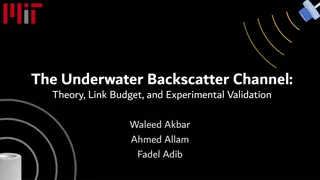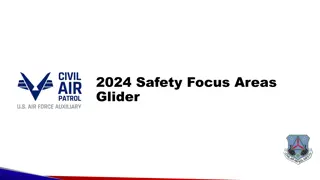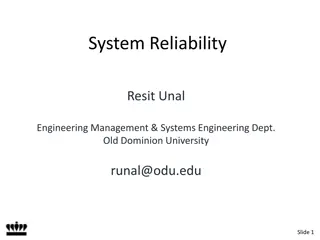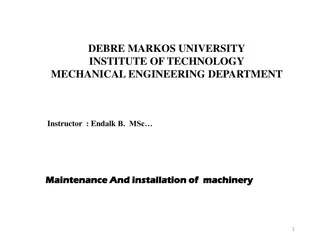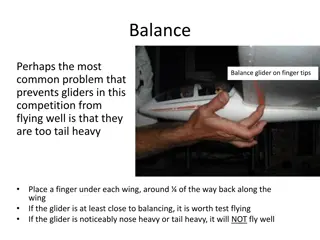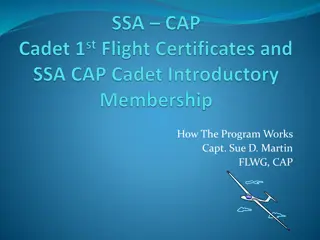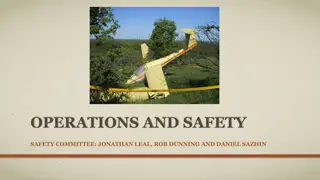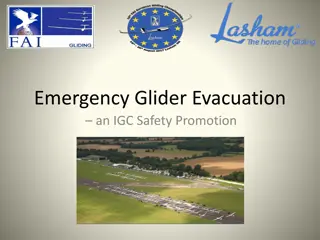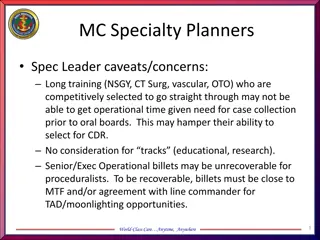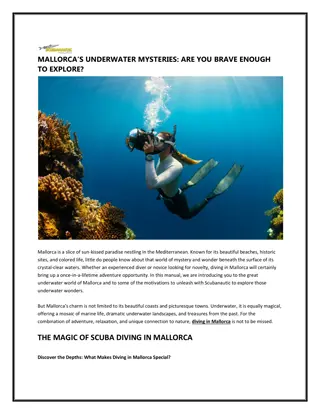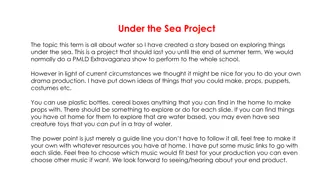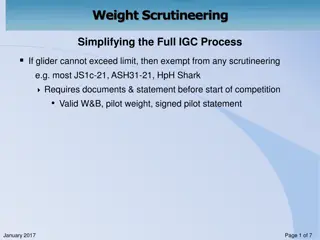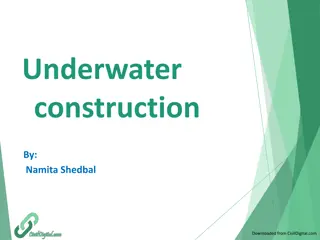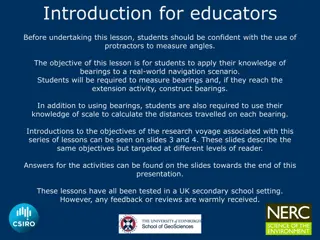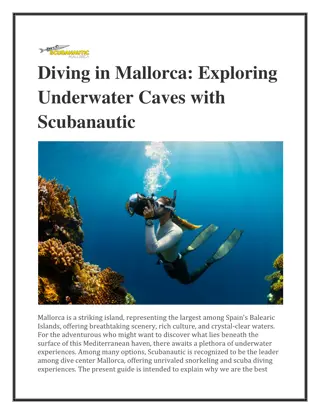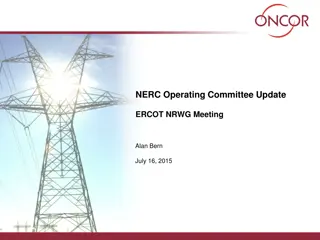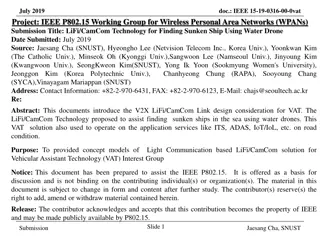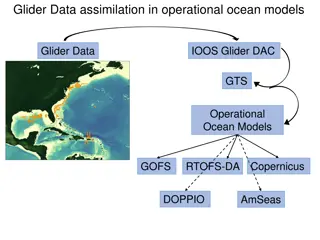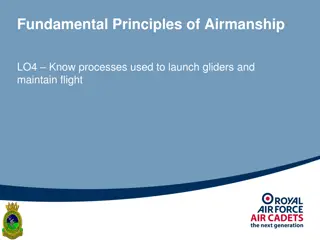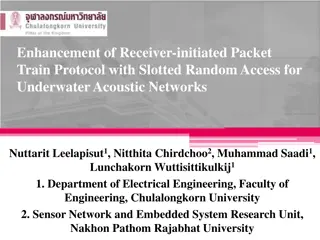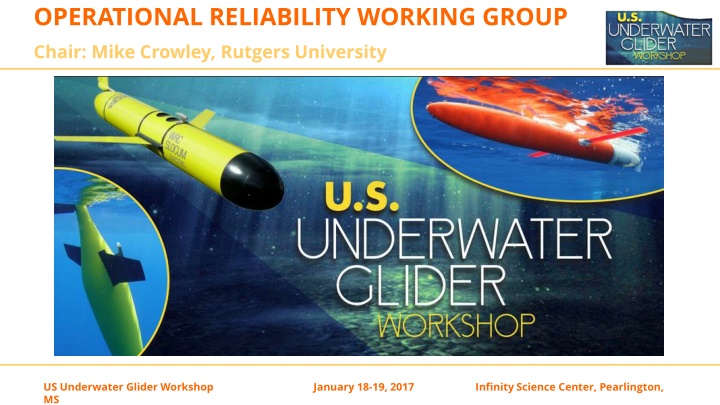
Achieving Glider Operational Reliability: Challenges and Strategies
Explore the operational reliability of underwater gliders, focusing on measuring dependability during deployment. The breakout session aims to identify requirements, challenges, and recommendations to minimize operational reliability risks. Discussions include success rates, failure reasons, and keys for success in utilizing gliders effectively.
Download Presentation

Please find below an Image/Link to download the presentation.
The content on the website is provided AS IS for your information and personal use only. It may not be sold, licensed, or shared on other websites without obtaining consent from the author. If you encounter any issues during the download, it is possible that the publisher has removed the file from their server.
You are allowed to download the files provided on this website for personal or commercial use, subject to the condition that they are used lawfully. All files are the property of their respective owners.
The content on the website is provided AS IS for your information and personal use only. It may not be sold, licensed, or shared on other websites without obtaining consent from the author.
E N D
Presentation Transcript
OPERATIONAL RELIABILITY WORKING GROUP Chair: Mike Crowley, Rutgers University US Underwater Glider Workshop MS January 18-19, 2017 Infinity Science Center, Pearlington,
Operational Reliability Overview: Glider operational reliability measures how dependable the observations are during deployment. Failure occurs due to weaknesses in the design, flaws in the materials, defects from the manufacturing processes, maintenance errors, improper operation, changes in operating concept, etc. Purpose of breakout is to determine how to implement strategies towards minimizing operational reliability risks Instructions (60 mins): 1. List requirements and/or opportunities 2. What are some of the challenges in achieving these opportunities? 3. Provide recommendations/next steps US Underwater Glider Workshop MS January 18-19, 2017 Infinity Science Center, Pearlington,
A few thoughts on reliability A few thoughts on reliability We are human. General success rates with gliders has varied considerably Statistical estimate basis varies (what is considered failure) Some examples Europe (Brito 2014) 50% success deep gliders, 59% shallow (Slocum, Sea, Spray) OOI approximately 57% success (Slocum) Rudnick 84% (79%) success (Spray) Rutgers 84% (79%) success (Slocum) US Underwater Glider Workshop MS January 18-19, 2017 Infinity Science Center, Pearlington,
Things to think about Things to think about Why are some groups more successful than others? Primary reasons for failure Operator (PEBKAC)? Hardware failure (instrument)? Software failure? Technology (glider type)? Biological impact, biofouling Bad luck? US Underwater Glider Workshop MS January 18-19, 2017 Infinity Science Center, Pearlington,
Ingredients for Success Ingredients for Success Some (not all) keys for success: A single person or small team prepares, deploys and pilots (communication) 75-100% time focused on gliders Regional expertise or do your homework Fishermen shallow bathymetry Currents Fresh water (river outflows, ice melt) Wrecks sea ice shipping lanes Models HF-RADAR Satellite US Underwater Glider Workshop MS January 18-19, 2017 Infinity Science Center, Pearlington,
Causes for failure Inexperienced people/lack of available prep time/rush Time between deployments Deployment team separate from prep team, not focused solely on glider work Biofouling or biological impact (shark, remora) Leaks Sensor failure (eg. ctd pump, or a pressure leak) Buoyancy (fresh water lens) Length of deployment (up to a year difficult, biology happens) 90 day cutoff (battery) Damage in shipping Environment challenges (currents) Weather Deployment impact (ship hits glider) Loss of steering Buoyancy pump Air bladder Ship strike Underwater hazards (crab traps, fishing gear, wrecks) Fishermen (pick up) New technology impacts time for prep and success rate Software bug Altimeter Connector issues after significant use US Underwater Glider Workshop MS January 18-19, 2017 Infinity Science Center, Pearlington,
Operational Reliability Opportunities Resource pools (local expertise) Training courses Test early (vendors) Guaranteed instrument tests prior to deployment and as new sensors come online (env testing). Set up standard preparation procedures (users & providers) Detailed feedback to glider producers to improve process Root cause analysis (RCA) Detailed record keeping by users US Underwater Glider Workshop MS January 18-19, 2017 Infinity Science Center, Pearlington,
Operational Reliability What are some of the challenges in achieving these opportunities? $$ Dedicated personnel Training Testing Technology refresh Configuration management You name it Centralized feedback org does not exist (user groups) US Underwater Glider Workshop MS January 18-19, 2017 Infinity Science Center, Pearlington,
Operational Reliability Recommendations/next steps (minimizing risks) 1-3 year goals Formalized testing procedures Procedures/preparation working group (workshops, webex, forum) Helium leak testers Improved software (data vis and piloting) US Underwater Glider Workshop MS January 18-19, 2017 Infinity Science Center, Pearlington,
Operational Reliability Recommendations/next steps (minimizing risks) 4-10 year goals Current technology needs to become more like commercial It will never be like operating a r/c car Improved power/batteries Biofouling improvements (including remora) Chlorine generation Snails on a tether Improved sensor calibrations Minimized sensor drift sensor/software redundancy where available Configuration management shared database of what sensors are used, how calibrated, etc Cross agency collaboration US Underwater Glider Workshop MS January 18-19, 2017 Infinity Science Center, Pearlington,

